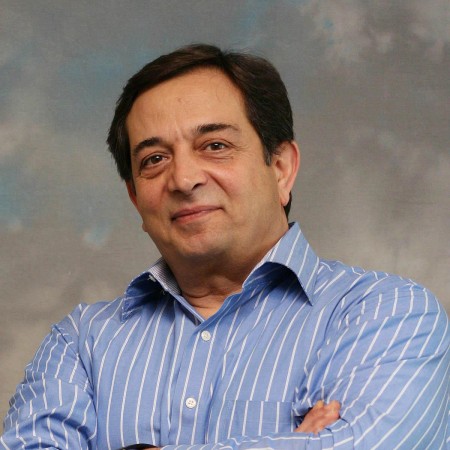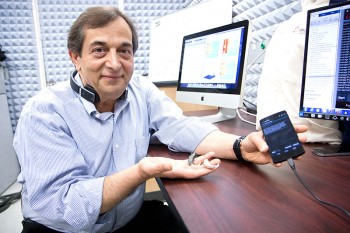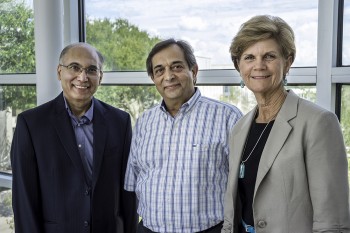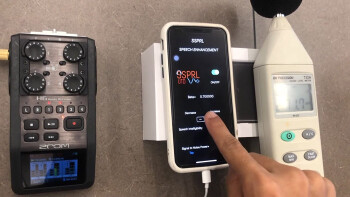
Professional Preparation
"University of Colorado, Boulder" - 1988
Florida Institute of Technology - 1978
Tehran Polytechnic University - 1974
Research Areas
Research Interests
Digital Signal Processing with emphasis on acoustics for Biomedical applications: MIMO Single and multi-dimensional digital filtering, noise cancellation and active noise control, signal detection and separation, parameter & spectral estimation, system identification methods, adaptive signal processingPublications
Appointments
University of Texas at Dallas [2003–Present]
University of Texas at Dallas [2001–2003]
Texas Instruments Inc., Dallas, TX [2000–2001]
Texas Instruments Inc, Houston, TX [1991–2000]
University of Colorado, Boulder [1986–1987]
Additional Information
Professional recognition, honors, membership
IEEE:
Jan 2007-Present: Senior member of IEEE, - Signal processing Society, Engineering in Medicine and Biology Society (EMBS),and Acoustic Society of America (ASA) .
Jul 2006-Present: Co-founder of IEEE-Dallas Chapter of Engineering in Medicine and Biology Society (EMBS).
Vice-Chair of IEEE-Dallas Chapter of EMBS.
Jan 2007- Present: Vice-Chair of the IEEE-Dallas Chapter of Signal Processing Society
Jan 2005 - Jan 2007: Program Chair, IEEE-Dallas Chapter of Signal Processing Society.
Apr. 2005: Recipient of the 2005 IEEE "Outstanding Service Award", IEEE-Dallas Section, Signal Processing Society.
Jan. 2004 - Jan 2005: Secretary/Treasurer, IEEE-Dallas Section, Signal Processing Society.
1981 to present: Member of IEEE; Signal Processing Society, EMBS, LEOS (Laser Electronics and Optical Society).
Invited Services:
Aug. 2008: Session Chair, "Brain Image Analysis", IEEE EMBC2008, Vancouver, Canada.
May 2008: Session Chair, "signal processing", SenSIP ( Sensors, Signals, and Information Processing) Conf, Sedona, AZ.
Aug. 2007: Session Chair, "fMRI signa lprocessing", IEEE EMBC2007, Lyon, France.
2004 to present: Reviewer for IEEE Transactions; Signal Processing, Communication, Circuits & Systems, Biomedical Eng.,Industrical Electronics, and the EURASIP Signal processing journals.
Texas Instruments Inc:
Sep. 1999: Elected as the TI's "Senior Member of The Technical Staff", for outstanding technical contributions to Texas Instruments Inc.
Sep. 1998: Recipient of the Texas Instruments "Pro-Team Award, in recognition of outstanding performance, leadership, and commitment".
Sep. 1997: Elected as the TI's "Member, Group Technical Staff", in recognition for excellence in technical contributions to the Semiconductor Group at Texas Instruments, Inc.
1995-2000: Member of Texas Instruments Industrial Advisory Team to Rice Univ., Texas A&M Univ. Univ. of Nevada at Reno, Univ. of Arkansas, Ohio State Univ.
1997-2001: Member of the TI team for university R&D funding and recruiting.
1996-1998: Member of TI-DSP product leadership team.
News Articles
Scientists Target Smartphone Technology to Improve Hearing Devices
 Many scientists agree: The smartphone offers many applications and has become one of the most sophisticated technologies out there.
Many scientists agree: The smartphone offers many applications and has become one of the most sophisticated technologies out there.With the support of a $522,000, two-year grant from the National Institutes of Health, a UT Dallas team wants to harness the power of smartphones to help improve the quality of life of people who wear hearing assistive devices (HAD), including hearing aids, cochlear implants and personal sound amplifiers.
NIH Funds to Spur Development of Technology for Hearing Impaired
 A team of UT Dallas researchers has received a grant from the National Institutes of Health (NIH) to develop an open-source platform that will enable researchers and companies to create hearing enhancing smartphone apps.
A team of UT Dallas researchers has received a grant from the National Institutes of Health (NIH) to develop an open-source platform that will enable researchers and companies to create hearing enhancing smartphone apps.Many smartphones feature advanced microphones and also use Bluetooth and wireless technology to connect to add-on devices. The $1.86 million, five-year grant will allow the researchers to develop a programmable, smartphone-based research platform for hearing aid studies, particularly for better filtering of sounds in various noisy environments and for providing noise-dependent speech enhancement with high quality and intelligibility.
Researchers Develop Smart Apps To Help People with Hearing Loss
 University of Texas at Dallas researchers have developed smartphone-based apps that solve the biggest problems for people with hearing loss: filtering out background noise and improving speech perception.
University of Texas at Dallas researchers have developed smartphone-based apps that solve the biggest problems for people with hearing loss: filtering out background noise and improving speech perception.One of the most recent apps, detailed in a study published online July 27 in The Journal of the Acoustical Society of America, uses artificial intelligence to remove extraneous babble, street background noise and other sounds via a smartphone and earbuds as well as devices using wired or wireless connection. The article is one of 67 studies that researchers have presented about their work for people with hearing loss in academic journals and at conferences since 2014.
The latest work, funded by a five-year, $1.86 million grant (5R01DC015430-05) from the National Institute on Deafness and other Communication Disorders of the National Institutes of Health (NIH), is part of an effort to develop an open-source research platform for speech processing and hearing improvement. The NIH also provided a two-year, $522,000 grant (5R56DC014020-02) in 2015 to use smartphone technology to improve hearing devices.